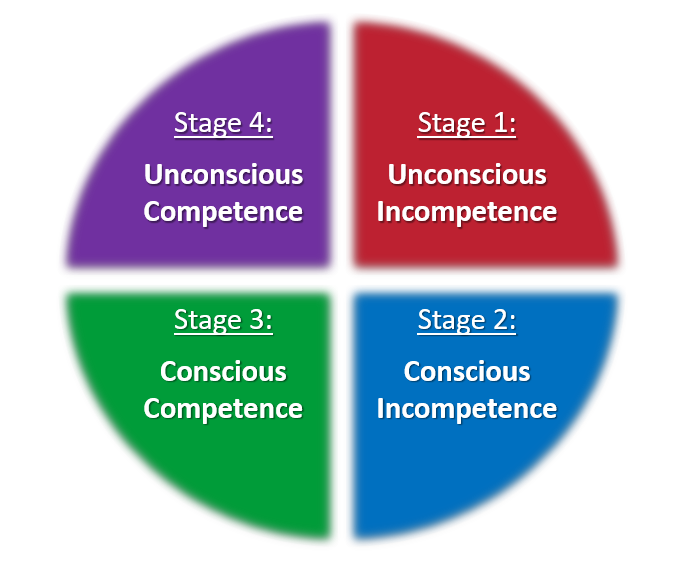
22 Jul Coaching Salespeople through 4 Levels of Competence
Great sales coaching involves having a strong understanding of how an individual develops a new skill. The conscious competence model explains the four stages of learning that individuals go through when building competence in a new skill.
The model was initially developed by Noel Burch at Gordon Training International. It provides a simple and practical framework for the learning process. According to the model, individuals move through the following four stages:

By being aware of what goes on at each stage, you can provide the proper coaching to help your salespeople achieve mastery of a new skill.
Stage One: Unconscious Incompetence
At stage one, the sales rep is unaware of his/her incompetence in a particular skill area. This can often be referred to as a blind spot. We all have blind spots. At this stage, ignorance is bliss. The sales rep is confident in his/her ability to perform a skill, because they’re not even aware of their incompetence or they don’t see a need to change.
Coaching a Sales Rep at Stage One:
At this stage, your objective is to create awareness of the deficiency. Before any change can take place, the sales rep must first become aware that their current behavior isn’t serving them as well as they thought.
To raise a sales rep’s level of awareness, during your next coaching session:
- Ask the rep to reflect and self-assess their last several sales calls
- Have the rep self-assess performance by looking at metrics together
- Listen to several recorded calls together (if applicable)
By applying one or more of the previous methods, you will quickly help the rep transition from stage one into stage two.
Stage Two: Conscious Incompetence
At this stage, the blind spot is removed. The sales rep is now aware of their deficiency and sees the need to improve. During stage two, the sales rep may feel vulnerable and self-conscious so the way in which you coach is critical.
Coaching a Sales Rep at Stage Two:
Effective coaching at this stage is all about asking questions to help the sales rep:
- Select the #1 behavior that needs to change
- Self-generate solutions
- Develop a clear action plan (for developing the new behavior)

In essence, you are helping the sales rep create the road map for how they will leave behind the ‘old behavior’ and adopt the ‘new behavior’. This will build responsibility and increase their commitment to change.
Stage Three: Conscious Competence
Once the sales rep reaches stage three, they are able to successfully perform the new behavior but not without a great deal of focus and concentration. When performing the behavior, the rep might say that it tends to feel “unnatural” or “mechanical”. There’s no need for concern as these feelings are completely normal when adopting a new behavior. As the rep continues to execute the behavior, it will feel more and more natural.
Coaching a Sales Rep at Stage Three:
This is the stage when the sales rep could easily slip back into their old way of doing things. As a coach you need to make sure you provide ongoing, timely feedback through spot-coaching. Your main objective at this stage is to reinforce and embed the new behavior.

Stage Four: Unconscious Competence
At this stage the new behavior has now become habitual. The sales rep has practiced the skill so much that it has become like “second nature”. The rep no longer needs to devote much conscious effort to performing the new skill. When you end up “performing in the zone”, you are most definitely at stage four of that skill area.
Coaching a Sales Rep at Stage Four:
At this stage, your goal is simply to ensure sustainment of the new behavior. However, as new standards arise and the ‘rules of the game’ change, the behavior may not be as useful anymore. If this happens, the sales rep is back at stage one – unconscious incompetence – and the learning journey starts all over again.
In Summary
By aligning the coaching process with the learning process, your coaching efforts will have a much greater impact. Make a commitment to understand what stage of the learning process each rep is in, as it relates to one specific skill. This will help you coach more effectively as you guide each sales rep on their journey towards mastering a new behavior.
About the Author: As a management consultant at Hallett Training & Consulting LLC, Matt works with companies to help them accelerate sales performance.


